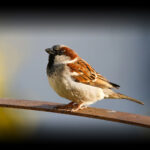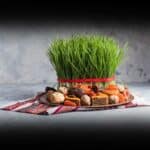Baháʼí Naw-Rúz or Naw-Rúz is celebrated on the first day of the Baháʼí calendar. Naw Ruz, which is Persian for ‘New Day’, is a holy day for the Baháʼí people. This year, it takes place on March 21. The day usually falls in the final weeks of March and is observed with immense joy, optimism, and faith in many middle eastern countries, including Iran. There is no specific way to celebrate as per the scripture. Baháʼí communities come together to pray, reflect, share a meal, and read the scripture of the holy day.
History of Naw-Ruz (Baha'i New Year)
Naw-Rúz is the annual celebration of the commencement of a new year, as per the Baháʼí calendar. Baháʼí is a new-age faith, established by Muslim preacher and spiritual leader Baháʼu’lláh in the 19th century. The faith has its roots in Iran and has spread through the remote parts of the Middle East. Abandonment of prejudice, unity, the relativity of religious truth, elimination of poverty, personal responsibility, and equality of men and women are some of the core tenets of the Baha’i faith.With less than eight million active and visible adherents as of 2022, the Baháʼí people are an incessantly targeted minority. The Baha’i calendar is composed of 19 months with 19 days. The first days of each month are called Baha, which translates to ‘splendor’ in Arabic. Naw-Rúz is the first day in the month of Baha and comes after the fasting month of Ala. Naw-Rúz is known as “the Day of God” by the Báb, who described his journey with faith as “He whom God shall make manifest.”The celebration symbolizes the renewal of time as per the writings of the founders of the religion Báb and Baháʼu’lláh, who used the spiritual metaphor of change as the common message to turn the page over the past year and welcome new blessings in life. As per the Baháʼí faith, the Naw-Rúz commemorates the arrival of spring, which is possible only due to the manifestations of God.
Naw-Ruz (Baha'i New Year) timeline
The first-ever Naw-Rúz is celebrated as per the Baháʼí calendar.
The Báb, a merchant from Qajar Iran, declares himself to be the messenger of God.
Kitáb-i-panj sha'n, the final work of the Báb, is published and distributed among the followers of the faith.
Baháʼu'lláh, the founder of the Baháʼí faith, announces the fulfillment of Bab’s prophecy 13 years after his death.
Naw-Ruz (Baha'i New Year) FAQs
What does the Naw-Rúz symbolize?
Naw-Rúz is the celebration of the arrival of spring and symbolizes the rebirth of nature. The fresh crop poking out of the ground is a reminder that a new day is here and winter will soon recede.
What is the meaning of a nine-pointed star?
In Baha’i customs, the nine-pointed star reflects the importance of faith in the disciples. Being the highest single-digit number, the number showcases completeness and fulfillment of the obligations of the religions of our past lives.
Why is Naw-Rúz celebrated?
Naw-Rúz, which translates to ‘new day,’ is the first day of a new year as per the Baha’i calendar. The holiday marks the arrival of spring and is celebrated in many middle eastern countries.
How to Observe Naw-Ruz (Baha'i New Year)
-
Celebrate spring
Pack a picnic, pull out your shorts, plan a hike, or get into the deep-cleaning mode — spring is here! There’s a lot to be thankful for in March, with spring topping the list with ease. Bask in the sunshine, open a can of spritzer, and get in the spirit of Naw-Rúz.
-
Cook a Persian feast
Honor the spirit of celebration by making some iconic Persian dishes yourself. Herbs, fruits, and nuts play a huge role in Persian cuisine. The menu can include vegetable stew, kebabs, jeweled rice, and barbeque chicken. Don’t forget to end the night with a glass of ‘falooda.’
-
Read the scripture
Baháʼí is a subreligion of Islam, and its teachings are rooted in parity, peace, brotherhood, and forbearance. The religion calls for equal status between men and women, promotes the justice and liberation of the oppressed, and rejects sexism, racism, and nationalism in all its form. This Naw-Rúz, learn more about the teachings of the Baháʼí faith and share its values with the people in your life.
5 Beautiful Persian Traditions To Mark Naw-Rúz
-
Cross the fire
Believers mark the eve of Charshanbe Suri by jumping over an open fire and banging spoons on a door to scare away any bad luck.
-
The cemetery gathering
People visit the cemeteries of their loved ones to honor the dead with new offerings and respect.
-
The feast of eggs
Revelers celebrate seeds and eggs to honor the festival of new life and fertility.
-
The seeds of glory
Farsi households organize the seven seeds ritual to honor the seven holy seeds of love, protection, fertility, patience, affluence, attraction, and rebirth.
-
The night of the potluck
A potluck dinner, along with community prayers and readings from Baháʼí scripture, is done by many communities.
Why Naw-Ruz (Baha'i New Year) is Important
-
It marks the arrival of spring
Our bodies battle the long nights of winter, just as our minds carry the final weeks of the year. The month of Ala is all about sacrifice and repentance through the act of fasting. The final weeks in the cold are the hardest, but our persistence comes from the hope of spring, which is marked by the celebration of Naw-Rúz.
-
It spreads the message of reconciliation
Naw-Rúz reminds us to come together and sow the seeds of love so we can all reap the fruits of solidarity. Through Naw-Rúz, the people of the Baháʼí faith practice solidarity within their families and between generations, spreading the message to practice reconciliation with their neighbors.
-
It honors the Baha’i traditions
It is one of the 11 observations of the Baha’i cultures and it reaffirms the faith of the people. Meals are cooked and scripture is read as the entire community comes together to celebrate a new day.
Naw-Ruz (Baha'i New Year) dates
| Year | Date | Day |
|---|---|---|
| 2022 | March 21 | Monday |
| 2023 | March 21 | Tuesday |
| 2024 | March 20 | Wednesday |
| 2025 | March 20 | Thursday |
| 2026 | March 21 | Saturday |







































